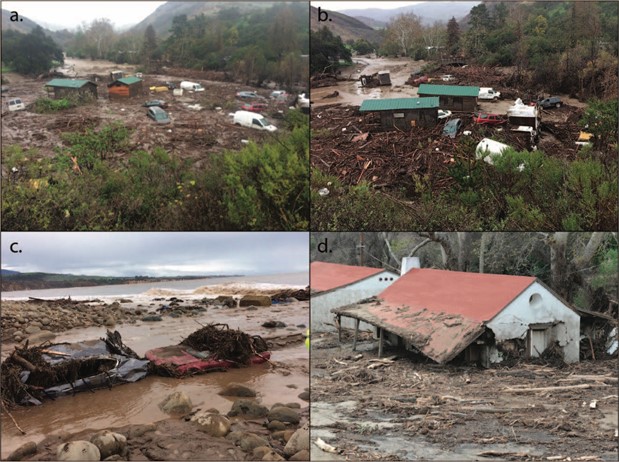CW3E Publication Notice
Assessment of a post-fire debris flow impacting El Capitan Watershed, Santa Barbara County, California, USA
December 20, 2021
J. Y. Schwartz (US Forest Service), N.S. Oakley (CW3E), P. Alessio (UCSB)
Click here for a personal use pdf of this article.
The 2016 Sherpa Fire burned 7,500 acres along the southern slope of the Santa Ynez Mountains west of Santa Barbara. A high-intensity rainfall event on January 20th 2017 initiated debris flows and sediment laden flooding in several recently burned watersheds, causing major damage to property and infrastructure primarily in El Capitan Canyon, El Capitan State Beach, and an oil and gas facility in Cañada del Corral. The authors document the conditions leading up to and outcomes of this impactful post-fire debris flow event.
Approximately 64% of the Sherpa Fire area experienced moderate to high soil burn severity. The area also features steep terrain and erodible soils, all conditions conducive to post-fire debris flow hazards. The high-intensity rainfall triggering the debris flows occurred within a weak-to-moderate atmospheric river, driven by a mesoscale vortex that developed and tracked west-to-east along the Santa Ynez Mountains. Peak rainfall intensities reached 0.75 inches in 15 minutes, a rate of 3 in/h, well over the debris flow-triggering threshold of 0.28 inches in 15 minutes (a rate of 1.1 in/h) advised in the final report by the Burned Area Emergency Response team for the first wet season following the fire.
Impacts of the post-fire debris flow in El Capitan Canyon (a-c) and Cañada del Corral (d).
No fatalities were reported, though 22 people were trapped in cabins and required immediate rescue from first responders. Nine cabins were destroyed and as many as 21 vehicles were carried away, some reaching the ocean. Boulders and woody debris clogged culverts and underpasses, contributing to the flooding and various impacts observed beyond the damage to cabins and vehicles, including impacts to infrastructure such as roads, bridges, and pipelines.
The documentation of damaging post-wildfire debris flow events like this one highlights the susceptibility to post-fire debris flows in the Santa Ynez Mountains and other mountainous regions of the southwestern US. This event occurred just one year prior to the devastating 9 January 2018 post-fire debris flow in Montecito that killed 23 people. In 2021, the Alisal Fire burned 17,000 acres just west of the Sherpa Fire burn scar, bringing renewed concern for post-fire debris flows to the Santa Ynez Mountains. Documenting conditions and impacts can inform the design of infrastructure, building code, and land use planning to reduce impacts of these hazards. It can also help officials plan for evacuations, impacts, and response prior to and following a post-fire debris flow.
This article appears in a special issue of Environmental and Engineering Geology honoring the legacy of Jerome (Jerry) DeGraff. Over his career, Jerry made important contributions to our understanding of natural hazards, reducing risk and protecting life and property, and providing scientific guidance to inform public policy. The full special issue can be accessed here.
The event described in this research occurred within an atmospheric river (AR) and describes the impacts of mesoscale phenomena embedded within an AR, addressing the CW3E values of AR research and applications. This work also addresses the CW3E value of monitoring of climate variability and change, as it documents an extreme high-intensity rainfall event and its impacts. Additionally, this research highlights CW3E’s core value of collaboration, as this is a collaboration across disciplines (geology and atmospheric science) as well as across agencies and universities (CW3E/UCSD, US Forest Service, and UCSB).
Schwartz, J. Y., Oakley, N.S., Alessio, P.; Assessment of a Post-Fire Debris Flow Impacting El Capitan Watershed, Santa Barbara County, California, U.S.A. Environmental and Engineering Geoscience 2021; 27 (4): 423–437. doi: https://doi.org/10.2113/EEG-D-21-00008

